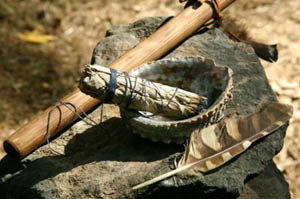SAGE, SWEETGRASS,
AND THE FIRST AMENDMENT
On a fall day in 1996, a student at Boston University sat in his dorm room, depression his only company. That was until the resident assistants for his floor knocked at the door and asked to be let in. They told him that his actions placed him in jeopardy of being kicked out of the dorm.
What had he been doing to get into trouble? Praying.

The problem wasn't that he was praying, it was the way he was doing it. He burned sage and sweetgrass while he prayed, a religious practice called smudging. He was doing what most traditionally oriented indigenous people of North America do, following a tradition that has been passed down for thousands of years.
The student tried explaining that to the resident assistants, but they had policies to follow and jobs to protect. Boston University, like many institutions of higher education, forbids the burning of candles and incense within dorms. When the R.A.s left the student's room, they took with them what he'd been praying with, leaving him more depressed than before.
One administrator later gave the student a memo advising him that "the Chapel is the most obvious location for prayer and worship," and although his "specific needs are somewhat unusual, the Chapel lends itself to an atmosphere of acceptance and assistance." The student was just going to have to get used to hiking more than a mile to the foreign confines of Marsh Chapel any time he needed to pray. Once there, he would have to explain his needs to the chapel's director or dean, and ignore any strange looks or rude remarks that others might direct at him while he tried to pray.
See the problem? The actions required by university policy are completely antagonistic to cultural and religious common sense. Praying in your home, dorm room or anywhere you choose is your birthright. And if we take into account American history--500 years marred by attempts to eradicate and assimilate people of color--policies like the one at Boston University come close to institutionalized racism.
RELATED: Anti-Indian Racism is Everywhere in America
Smudging is not the same as burning incense and should not be considered under the same light. Smudging involves burning material like sage or cedar in an abalone shell, tin can, or other container that will hold the ashes safely. The person who is praying handles the burning material with respect and care. As Gene Thin Elk, the Native American cultural advisor at the University of South Dakota , explains on the form that students there can fill out to request an exception from a ban on burning incense in the dorms: "[W]e pray on a daily basis, usually in privacy and solitude. Part of our religion is the use of natural plants like sage, cedar, and sweetgrass, which are burned from the beginning of our prayers to the conclusion. . . . These plants' lives are not used as incense, but as a sacred rite in which the plants give their lives so that we can live a good life. In turn, one day we shall give our lives so that the plant nations may live."
In contrast, most people use incense and candles simply to contribute to the ambience of a room. They often leave burning incense and candles unattended. Smudging is far less likely to be a fire hazard than candles-or cigarettes, which on many campuses are not banned in the dorms.
Smudging does produce a smell that some people can mistake for marijuana. Almost everyone recognizes the smells of burning tobacco, wood, and paper. But people unfamiliar with smudging often assume that its smell is caused by incense or marijuana. Until several years ago, it was common for students who had been smudging at South Dakota to be frisked by dormitory officials and to have their rooms searched and their smudging materials confiscated.
The University of South Dakota now permits students to smudge in their dorm rooms if they follow university policies. Its current rules are a good model for other institutions to follow and build upon.
Students at South Dakota who wish to smudge, or to perform any ritual that would violate university policies, must first make a written request to their dorm's director, called the complex director, for an exception to the policy. The student then meets with the complex director and the university's Native American cultural adviser, who decide whether to approve the request. Students must not use alcohol or illegal drugs during ceremonies, a mandate that echoes traditional indigenous teachings. Any student who breaks that rule loses the right to smudge, at least temporarily, and must meet with his or her adviser and the complex director to discuss the violation.
RELATED: Offensive Words Lead to Offensive Actions
Although smudging produces only about as much smoke as a cigarette does, some students may be allergic to the smoke. The university requires students to open a window when they smudge, and encourages them to use a fan for additional ventilation. An extra safeguard would be to ask students who apply for university housing if they have any allergies; students who might be allergic to smoke could be assigned roommates who don't smudge.
All students at South Dakota have the option of living on a Native American floor in a dorm. That gives indigenous students a safe place for cultural practices like smudging and encourages cross-cultural understanding with other students who choose to live on those floors-in stark contrast to other institutions' kicking students out of dorms for practicing their religion.
On most campuses, Native American students are so outnumbered as to be invisible, which is almost certainly one reason for institutions' reluctance to change their policies and allow smudging in their dorms. But the fundamental issue is not smudging alone-it is the right of every person to practice his or her religion.
If we do not act to overturn bans on smudging, we condone policies that, intentionally or not, foster racism.
From The Chronicle of Higher Education, 18 May, 2001, Sec. 2: B16.
Read it on The Chronicle of Higher Education (subscription required): Sage, Sweetgrass, and the First Amendment >>
Please feel free to share this article over social media using the following shortened link: http://bit.ly/14h9w7b.
If you enjoyed this article, please take a moment to provide a testimonial. Your support will help Dr. Stokes to continue his work. You can also follow Dr. Stokes on Twitter, Facebook, LinkedIn, and Pinterest.



